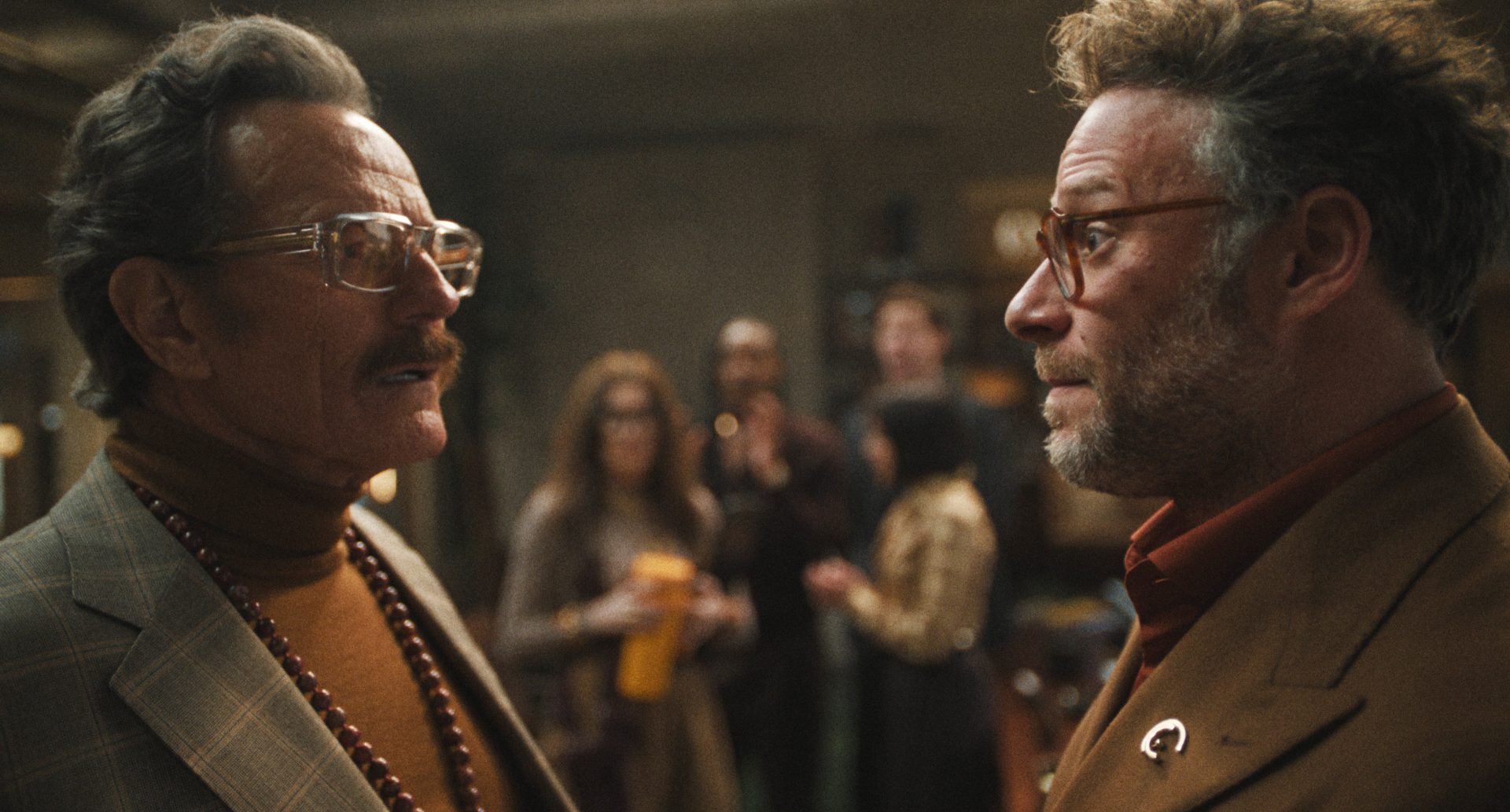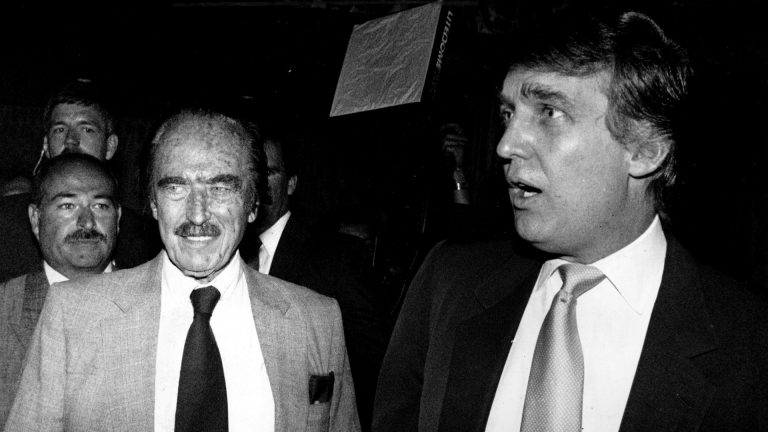PICK OF THE WEEK
The Studio (Apple TV+)
Newly appointed head of Continental Studios Matt Remick (Seth Rogen) cannot believe his luck when Martin Scorsese asks him to take on his epic adaptation of the 1978 Jonestown massacre.
Meanwhile, Matt is under intense pressure to deliver a box office hit with a movie based on the Kool-Aid franchise – the very drink that, according to legend, was spiked with poison to kill hundreds of cultists in Guyana. What should he tell the legendary auteur director when they meet again at Charlize Theron’s party?
It is such comic dilemmas that make The Studio – two of the ten episodes are now online – such a joy and one of the very best streaming series of 2025 so far. Since their breakout movie Superbad (2007), Rogen and Evan Goldberg have developed one of the most successful writing and directing partnerships in Hollywood (and have also made time to co-found Houseplant, a cannabis lifestyle company).
No surprise, then, that they were able to persuade so many stars to play and lampoon themselves: Anthony Mackie, Paul Dano, Zoe Kravitz, Olivia Wilde, Ice Cube, Zac Efron, Sarah Polley, Ron Howard, Johnny Knoxville, and, of course, Scorsese.
Kravitz is hilarious playing herself high as a kite before a major presentation in Las Vegas – having inadvertently eaten shroom chocolates that Matt, in a desperate bid to appear cool, has laid out in his hotel suite as an “old school Hollywood buffet”.
Howard undercuts his industry image as the nicest guy in Tinseltown with a torrent of vicious bile. Ice Cube turns out to be much more concerned by the use of AI than by white executives’ paranoia about racism. The influence of the much-missed Curb Your Enthusiasm is evident in the careful structuring of each episode around a specific calamity or heinous embarrassment.
Kathryn Hahn is terrific as Continental’s take-no-prisoners marketing chief, Maya, as is Ike Barinholtz as Sal Seperstein, Matt’s closest colleague and best friend – who, this being Hollywood, is more than ready to stick the knife in. Watch out for the Golden Globes episode in which all the winners thank Sal, and Matt, craving credit for himself, resorts to desperate measures.
Also fabulous is Bryan Cranston as profit-crazy, deranged company chair Griffin Mill – his name a homage to the character played by Tim Robbins in Robert Altman’s classic Hollywood satire, The Player (1992). In this and other fond tributes is encoded the sentimental secret of a series ostensibly marked by cynical humour, which is that Rogen and Goldberg are in love with the movies that they parody and reference: from popcorn fare, via Chinatown and neo-noir to arthouse experimentalism.
For all the pratfalls, humiliations and commercial compromise, nothing can finish off Matt’s romance with the medium. “Film’s a fucking pain in my ass,” grumbles a projectionist. The studio head’s blissful expression tells a different story.
STREAMING
My Brain: After the Rupture (iPlayer)
I first met Clemency Burton-Hill when I was editing The Spectator and she was a rising star amongst its contributors. She seemed to be able to write with panache about anything. And this chimed with a broader polymathy – for, in addition to her journalism, she was a gifted musician, actress, broadcaster and novelist.
On top of which, and most importantly, she was a terrific person, who found true love with James Roscoe (a diplomat tipped for the top). And before you knew it, they were off to New York: he to the UN, she to become creative director at New York public radio.
On January 20, 2020, as she was beginning work on her second non-fiction book, she suffered a massive brain haemorrhage that capsized her world, requiring emergency surgery and leaving her intubated for 17 days. In Ursula Macfarlane’s immensely powerful and candid documentary, she chronicles her recovery – by its nature, a non-linear process – and the incredibly hard yards she has travelled to keep facing forward.
“My future self,” she says, “is also going back to my past self – but being changed irrevocably”. Much of this has involved getting the measure of what she describes as the bomb that remains in her head: “Ticking, ticking, ticking”. She has had to learn to speak again; to play the piano and violin again (“I am impatient!”); to embrace everyday life once more. True courage, as she shows, involves both acute distress and a determination to keep going; a readiness to accept that fate is capricious, sometimes brutally so, matched by a decision to persist nonetheless.
“The smallest things,” she says, “are gifts”. It feels much too glib and inadequate to say that her recovery is her most formidable accomplishment yet. I believe, in any case, that her greatest successes, in life and work, lie ahead. “I do not want to be a broadcaster,” she says, “that only talks about my fucking brain injury”. Brava; bravissima.
BOOK
Ghosts of Iron Mountain: The Hoax That Duped America and Its Sinister Legacy, by Phil Tinline (Head of Zeus)
In 1967, a profoundly alarming government plan was leaked and published by the radical imprint Dial Press, whose editor-in-chief was the novelist EL Doctorow. As the writer and journalist Leonard Lewin explained in the book’s preface, the plan was the work of a top-secret study, based at the Iron Mountain nuclear bunker in the Hudson Valley, NY. It forecast terrible consequences for US society if a lasting peace broke out and the nation’s mighty war machine declined.
To maintain public confidence in political authority, the threat of nuclear attack would have to be replaced with a similarly existential peril, such as “massive global environmental pollution”. There would be, the researchers predicted, a serious risk of social disintegration and a consequent need for “blood games” to assuage male aggression, not to mention eugenics and even the revival of slavery.
The Report from Iron Mountain on the Possibility and Desirability of Peace was a runaway bestseller that triggered a media storm. In fact, as Phil Tinline writes in this compelling page-turner, the “study” was an ingenious hoax, the work of Lewin himself, spurred on by Victor Navasky, editor of the satirical magazine, Monocle, his colleagues and a small group of insiders that included such luminaries as JK Galbraith.
A glorious spoof? Well, yes. But also, as it turned out, too good. For, as Tinline reveals, plenty of people continued to believe that the study was authentic, and that the hoax story was itself a devious bluff.
In the decades since, the notion that America is controlled by a deep state, rooted in the military-industrial complex and determined to maintain its power by any means necessary, has appealed both to anti-war radicals like Oliver Stone – who put the thesis at the heart of his movie JFK (1991) – and to the conspiracy theorists of the MAGA era, including QAnon extremists. What emerges from all the fascinating detail that Tinline has assembled is a parable of contemporary political culture, confirming his status as one of our foremost historians of ideas.
FILM
Novocaine (general release)
If you have recovered from the body horror of Coralie Fargeat’s The Substance and are in the mood for a thoroughly entertaining popcorn movie, then this cartoonish shock-romp will be just the ticket. Directed by Dan Berk and Robert Olsen, it depends entirely upon Jack Quaid (son of Meg Ryan and Dennis Quaid), an increasingly assured screen talent whom you may recall as the physicist Richard Feynman in Oppenheimer (2023), playing the bongos deliriously after the successful nuclear Trinity Test.
In a clear nod to Jim Carrey’s role in The Mask (1994), Quaid plays a mild-mannered junior bank manager called Nathan Caine, who suffers from the real-life genetic condition CIPA (congenital insensitivity to pain with anhidrosis). This means that he cannot eat solid food, lest he bite off his tongue; has to place tennis balls on the sharp edges of furniture; and sets his timer to alert him at three-hour intervals to prevent his bladder from bursting.
But when romance blossoms with his colleague Sherry (Amber Midthunder) and she is kidnapped in a heist (look out for Jack Nicholson’s son, Ray, as one of the villains), Nathan throws caution to the wind and races to rescue her.
This sets up a series of increasingly gruesome set-pieces in which, like John Wick’s nerdy nephew, he turns his affliction into a superpower: shot, deep-fried, tortured (he has to feign pain), pierced by shards of glass, skewered by an arrow, and still on the case. Novocaine is a splendidly silly screwball action flick and a portent of great things to come for its star.
TV/STREAMING
Douglas Adams: The Man Who Imagined Our Future (Sky Arts/NOW)
Almost a quarter-century since his death aged only 49, Douglas Adams is as central to contemporary culture as he ever was: probably more so. Elon Musk, for one, is famously obsessed by The Hitchhiker’s Guide to the Galaxy: in 2018, when the tech tycoon launched a cherry-red Tesla Roadster into orbit on his new Falcon Heavy rocket, he put a copy of the first book in the series into the glove compartment and a sign on the dashboard that read: “DON’T PANIC!”
As Adams’s friend Stephen Fry reflects in Todd Austin’s fine new documentary, “Douglas would be disappointed, to say the least, by what has happened [to technology and the Internet], by the souring of it all, by the dream being tarnished”. Even so, the hand-held galactic guide that he imagined in his extraordinary science-fiction world – initially in a BBC radio drama in 1978 – prefigured the iPhone by nearly 30 years and Wikipedia by 23.
Indeed, had Adams not been among the entrepreneurial victims of the dotcom crash, his own real-life, crowd-sourced version of the guide might have been the market leader with us to this day.
Austin takes us on a brisk journey from Adams’s school days (with Griff Rhys Jones) and thespian life at Cambridge via a brief writing partnership with Monty Python’s Graham Chapman to his global triumph with the Hitchhiker’s books and, later, as a passionate champion of biodiversity.
Writing became more and more of a penance, especially with success, and he suffered bouts of depression. But his status as an authentic visionary and the PG Wodehouse of his generation is beyond question.











